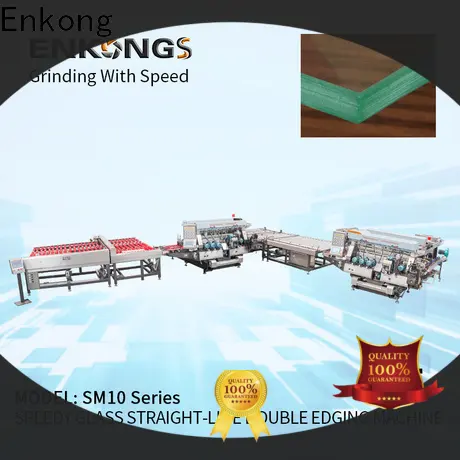Company Advantages1. The manufacturing process of Enkong covers sophisticated workmanship. Its mechanical parts and components have to go through rough machining, cutting, grinding, honing, finish milling, and polishing. Our machines are safe enough to operate
2. The product is guaranteed to have a greater market application potential as customers get lots of economic benefits out of it. We can provide technical support for our products
3. Besides ,
double glass machine is also very popular for its . We have perfect after-sale service for our products
4. The quality and performance of the product have been greatly improved by our excellent R&D team. The delivery time for our product is 25-40 days
5. The performance of this product has been tested time after time. The performance and operation of our products are stable
/ General description
Production speed of 1-18m/min
The automatic detects the glass length and width dimensions
Comprehensive solution setting, suitable for construction and decorative glass with variable size
![Latest double glass machine SYM08 for business for photovoltaic panel processing 4]()
/ Technical Date
Technical Date
◆ Number of Spindles: 10
◆ Max. glass dimension: Up to 2500
◆ Min. glass size: 300x300
◆ Glass thickness: 3~12 mm
◆ Working Speed: 0.5-18m/min
◆ Width adjustment Speed: 8m/min 16m/min
◆ Max. edge grinding: 1mm
◆ Tolerance of the diagonal(1000x1000): ±0.3mm
◆Tolerance on the parallelism(mm): ±0.1mm
◆ Total power: 35 KW
/ producy detials
Power supply: AC220V, 380V, 415V ±10% 3φ 50Hz/60Hz±2%
Environment: Temperature: 1~40℃
Company Features1. Guangdong Enkong Machinery Co.,Ltd. has been involving in the production of for many years. We are going to expand our business globally.
2. Our factory has the most advanced machines. Some of them are imported from Germany. They help us optimize production processes, reduce downtime and increase product yield.
3. Our firm bears societal responsibilities. We strive to constantly improve the environmental performances by assessing the ecological effects associated with a product system by the purchase of raw material during manufacturing, transportation, use, end-of-life treatment, recycling, and disposal.







